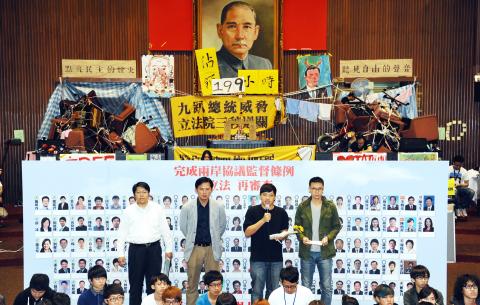The leaders of student protesters occupying the legislative chamber and civic group representatives yesterday agreed to meet with President Ma Ying-jeou (馬英九) without preconditions, as they called for lawmakers’ support for the passage of an act on the oversight of cross-strait agreements.
The protesters made the statement in response to remarks by Presidential Office spokesperson Lee Chia-fei (李佳霏), who said that Ma is willing to meet with representatives of protesting students “without any preconditions” to help end the standoff over the cross-strait trade agreement and allow the legislature to get back on track.
Lee said Ma is willing to invite representatives of the protesters to the Presidential Office in Taipei to discuss the pact and listen to their views if it will help end the student-led occupation of the legislature that began on Tuesday last week.

Photo: Chang Chia-ming, Taipei Times
Lin Fei-fan (林飛帆), a National Taiwan University graduate student and one of the student leaders, said the protesters agreed to have a conversation with Ma without preconditions and proposed two questions that have attracted wide attention for the potential discussion between the two sides.
“The first question is whether there is a need for the institutionalization of the supervision of cross-strait agreements, and the second is whether such a supervision mechanism needs to be in place before reviewing the cross-strait service trade agreement,” Lin said.
Lin added that the students are willing to converse with Ma “in a public setting” and to discuss “in concrete terms” the questions mentioned.
“By the time we get there to have the conversation, we will not want to take extra time to give him a lecture,” Lin said.
Another student leader, Chen Wei-ting (陳為廷), a graduate student at National Tsing Hua University, said that the conversation should not be a private one that can be heard only by the representatives, but one that is open to public witness.
The protest leaders and civil group representatives said that the minutes of the latest legislative meeting on March 17, made public yesterday, showed that the review of the trade pact, which according to Chinese Nationalist Party (KMT) lawmakers has been completed, was not documented.
It means that the issue has been returned to the legislature’s Internal Administrative Committee pending further discussion, the group said.
“We ask the government not to hold any negotiations with the Chinese government until the institutionalization of the supervision of cross-strait agreements. The trade pact must be returned to the Executive Yuan until such institutionalization is completed,” Chen said.
The group called on legislators to promise to respond to their three requests.
“Our first request is that the legalization of a ‘cross-strait agreement oversight act’ be initiated during this legislative plenary session. The second is that any reviews of cross-strait agreements be held off until legislation is finalized. And finally, that the bill be placed on the legislature’s Procedure Committee agenda,” Chen said.
Huang Kuo-chang (黃國昌), a research fellow at Academia Sinica, said that the call is “aimed at each legislator rather than only at the party caucus.”
While some, mainly the media, have been asking what the protesters’ “exit strategy” is, Lin said: “It is president Ma who needs to have an ‘exit strategy.’”
Additional reporting by CNA

‘WIN-WIN’: The Philippines, and central and eastern European countries are important potential drone cooperation partners, Minister of Foreign Affairs Lin Chia-lung said Minister of Foreign Affairs Lin Chia-lung (林佳龍) in an interview published yesterday confirmed that there are joint ventures between Taiwan and Poland in the drone industry. Lin made the remark in an exclusive interview with the Chinese-language Liberty Times (the Taipei Times’ sister paper). The government-backed Taiwan Excellence Drone International Business Opportunities Alliance and the Polish Chamber of Unmanned Systems on Wednesday last week signed a memorandum of understanding in Poland to develop a “non-China” supply chain for drones and work together on key technologies. Asked if Taiwan prioritized Poland among central and eastern European countries in drone collaboration, Lin

The Chien Feng IV (勁蜂, Mighty Hornet) loitering munition is on track to enter flight tests next month in connection with potential adoption by Taiwanese and US armed forces, a government source said yesterday. The kamikaze drone, which boasts a range of 1,000km, debuted at the Taipei Aerospace and Defense Technology Exhibition in September, the official said on condition of anonymity. The Chungshan Institute of Science and Technology and US-based Kratos Defense jointly developed the platform by leveraging the engine and airframe of the latter’s MQM-178 Firejet target drone, they said. The uncrewed aerial vehicle is designed to utilize an artificial intelligence computer

Renewed border fighting between Thailand and Cambodia showed no signs of abating yesterday, leaving hundreds of thousands of displaced people in both countries living in strained conditions as more flooded into temporary shelters. Reporters on the Thai side of the border heard sounds of outgoing, indirect fire yesterday. About 400,000 people have been evacuated from affected areas in Thailand and about 700 schools closed while fighting was ongoing in four border provinces, said Thai Rear Admiral Surasant Kongsiri, a spokesman for the military. Cambodia evacuated more than 127,000 villagers and closed hundreds of schools, the Thai Ministry of Defense said. Thailand’s military announced that

CABINET APPROVAL: People seeking assisted reproduction must be assessed to determine whether they would be adequate parents, the planned changes say Proposed amendments to the Assisted Reproduction Act (人工生殖法) advanced yesterday by the Executive Yuan would grant married lesbian couples and single women access to legal assisted reproductive services. The proposed revisions are “based on the fundamental principle of respecting women’s reproductive autonomy,” Cabinet spokesperson Michelle Lee (李慧芝) quoted Vice Premier Cheng Li-chiun (鄭麗君), who presided over a Cabinet meeting earlier yesterday, as saying at the briefing. The draft amendment would be submitted to the legislature for review. The Ministry of Health and Welfare, which proposed the amendments, said that experts on children’s rights, gender equality, law and medicine attended cross-disciplinary meetings, adding that